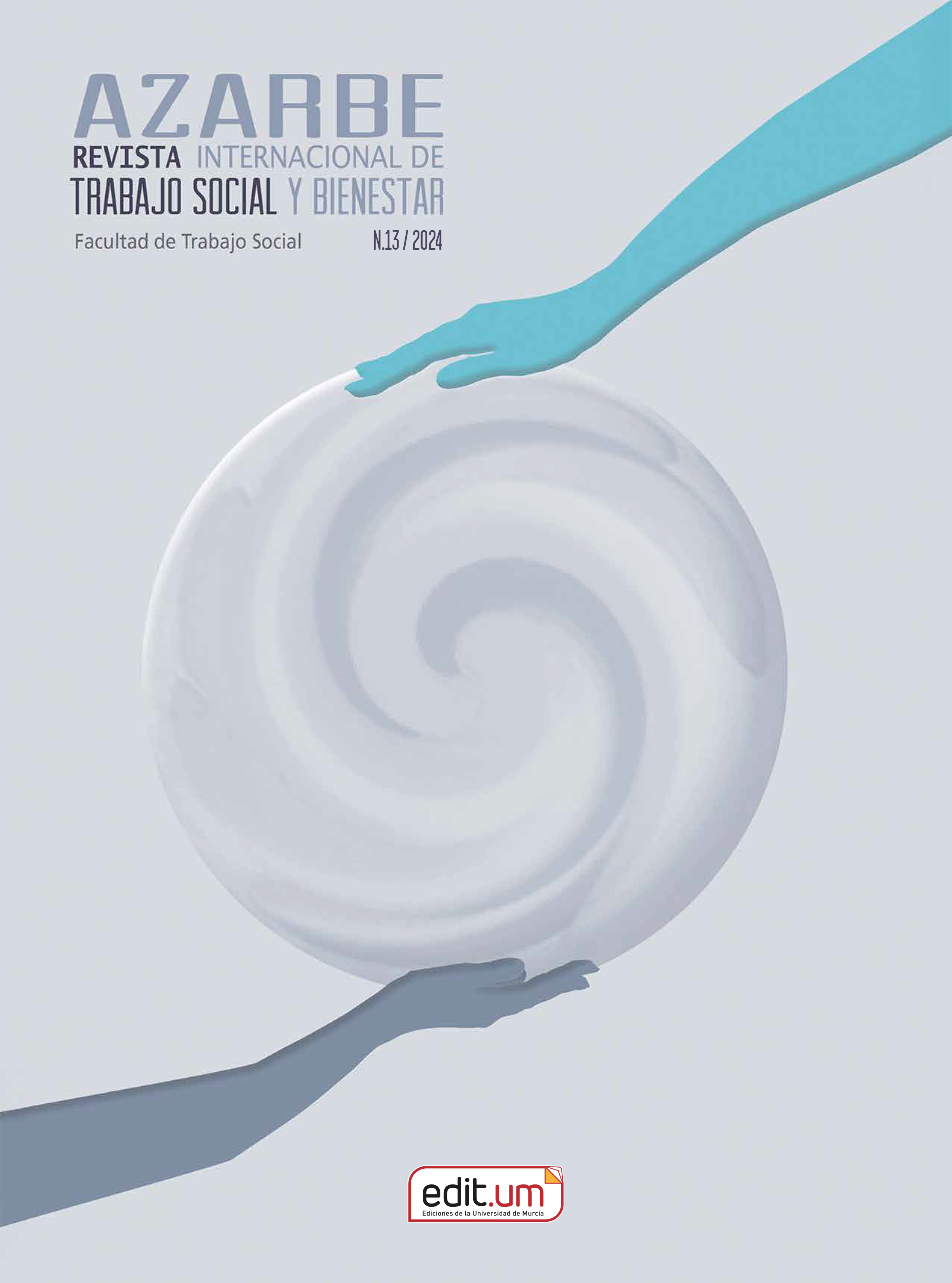Senior Cohousing: a model of coexistence to know and learn from Social Work
Abstract
This study arises from the need to investigate the population's knowledge and information about Senior Cohousing, as an alternative to traditional residential centers. This new model allows the elderly to manage their own old age, share needs and have an active aging, offering a real alternative to maintaining their autonomous life while keeping quality of life and social contact. Method: a mixed methodology study has been designed, through a questionnaire to the general population and in-depth interviews with residents of Cohousings, in which a total of 261 subjects participated. Results: in general, the population shows a high lack of knowledge about Cohousing (61% of the participants), even though the need for a change in the residential models as we know them today is evident. Discussion: People who do not know about Cohousing show a great interest in this model as they consider it very beneficial. Regarding the negative points, they can be remedied with help from public administrations and with a professional of reference, who mobilizes and coordinates, such as a social worker. Conclusions: Cohousing is a model of coexistence that allows people to continue with their personal development, maintaining their quality of life and promoting active aging, without seeing their life altered abruptly by institutionalization in a residence. The success of Cohousing in Spain will depend largely on governmental support.
Downloads
-
Abstract933
-
pdf (Español (España))389
References
BamFord, G. (2004). Living together on one’s own: Cohousing for older people – an example from Denmark and The Netherlands. Conferencia en Queensland Shelter Housing 15-17 de junio de 2004. Disponible en: http://espace.library.uq.edu.au/view/UQ:13687.
Bastús Ruiz, B. (2024). La importancia de las actuaciones municipales en la garantía del derecho a la vivienda. Entre el urbanismo y la colaboración. Revista de Estudios de la Administración Local y Autonómica, 21, 160-184. https://doi.org/10.24965/reala.11298ARTÍCULOS182
Bermejo Higuera, J. C. (2016). La soledad en los mayores. ARS Médica, 32(2), 126-135. https://doi.org/10.11565/arsmed.v32i2.264
Brenton, M. (2013). Senior cohousing communities - an alternative approach for the UK? JRF. Disponible en: https://www.jrf.org.uk/housing/senior-cohousing-communities-an-alternative-approach-for-the-uk.
Del Monte Diego, Javier (2017). COHOUSING. Modelo residencial colaborativo y capacitante para un envejecimiento feliz. Estudios de la Fundación Pilares para la autonomía personal, 4. Asociación Jubilares.
Durrett, C. (2015). El manual del senior cohousing: Autonomía personal a través de la comunidad. Dykinson, S.L. (Traducción española por Asociación Jubilares).
Durrett, C., & McCamant, K. (2011). Creating cohousing: Building Sustainable Communities. New Society Publishers.
Fernández Ballesteros, R. y Sánchez Izquierdo Alonso, M. (2020). Impacto del COVID-19 en personas mayores en España: algunos resultados y reflexiones. Clínica y Salud, 31(3), 165-169. https://doi.org/10.5093/clysa2020a25
Fernández Cubero, A. (2015). Cuerpo, género y vejez en las Viviendas Colaborativas para personas mayores (Trabajo Final de Máster). Universidad del País Vasco - Euskal Herriko Unibertsitatea. Disponible en: https://pdfs.semanticscholar.org/e98d/6007a5a81dec756aabca43c67865985adeeb.pdf.
Gómez González, S. (2021). El senior cohousing: alternativa residencial para el envejecimiento activo. Implicaciones para el Trabajo Social. TFG. Universidad de Valladolid. Facultad de Educación y Trabajo Social https://uvadoc.uva.es/handle/10324/49421
Gummà Serra, E. y Castilla Mora, M. R. (2019). El bienestar emocional como predictor de calidad de vida en los senior co-housing. Cuadernos de trabajo social, 32(2), 365-380. https://doi.org/10.5209/cuts.59461
Gummá Serra, E. y Castilla Mora, M. R. (2017). Cohousing de personas mayores: Un recurso residencial emergente. Documentos de Trabajo Social: Revista de Trabajo y Acción Social, 59, 51-84.
Consejo Superior de Investigaciones Científicas (CSIC) (2023). Informes Envejecimiento en red nº 30, 40 p. [Fecha de publicación: 31/10/2023]. https://envejecimientoenred.csic.es/un-perfil-de-las-personas-mayores-en-espana-2023-indicadores-estadisticos-basicos/. http://hdl.handle.net/10261/341851
Instituto Nacional Estadística (2023). Indicadores demográficos. Recuperado de:
Instituto Nacional de Estadísitica. (2023). Esperanza de vida a diferentes edades. Recuperado de https://www.ine.es/ss/Satellite?L=es_ES&c=INESeccion_C&cid=1259944484459&p=1254735110672&pagename=ProductosYServicios%2FPYSLayout¶m1=PYSDetalleFichaIndicador¶m3=1259937499084#.
Keller Garganté, C. y Ezquerra Samper, S. (2021) Viviendas colaborativas de personas mayores: democratizar el cuidado en la vejez. Revesco, 137, 1-22. https://dx.doi.org/10.5209/REVE.71867
Kingston, P., Bernard, M., Biggs, S., y Nettleton, H. (2001) Assessing the health impact of age-specific housing. Health and Social Care in the Community, 9 (4), 228–234. https://doi.org/10.1046/j.1365-2524.2001.00298.x.
Lebrusán Murillo, I. (2020). Las dificultades para habitar en la vejez. Documentación Social, 6. Recuperado de https://www.documentacionsocial.es/6/a-fondo/las-dificultades-para-habitar-en-la-vejez/?print=pdf
Lillo Beneyto, M. A., & Ramos Feijóo, C. (2023). Procesos de cuidado e impacto del COVID 19 en mujeres cuidadoras.: Estudio de caso en la provincia de Alicante. AZARBE, Revista Internacional de Trabajo Social y Bienestar, (12), 15–24. https://doi.org/10.6018/azarbe.584791
Lorente, R., Brotons, P. y Sitges, E. (2020). Estrategias para combatir el edadismo: ¿formación específica sobre envejecimiento o contacto intergeneracional? Cuaderno de Pedagogía Universitaria, 17 (33), 6-16. https://doi.org/10.29197/cpu.v17i33.368.
Martínez Rodriguez, T. (2011). La Atención gerontológica centrada en la persona: guía para la intervención profesional en los centros y servicios de atención a personas mayores en situación de fragilidad o dependencia. Documentos de Bienestar Social, 76. Servicio Central de Publicaciones del Gobierno Vasco, Vitoria. https://datos.bne.es/edicion/a5129509.html.
Martínez Rodríguez, T., Díaz-Veiga, P., Rodríguez Rodríguez, P., y Sancho Castiello, M. (2015). Modelo de atención centrada en la persona. Presentación de los cuadernos prácticos. Informes envejecimiento en red, nº 12. [fecha de publicación: 30/07/2015] http://envejecimiento.csic.es/documentos/documentos/enred-modeloatenciocuadernosmatia.pdf
Martínez Martínez, A.L., Clemente Soler, J.A., Sánchez Vera, P., Rodríguez Guillén, D., y Martínez Rubio, M. (2022). Aproximación a los hogares unipersonales en la senectud. Pg 367-381. Santos González, D y Tamboleo García, R. Campos de sociología bajo presión. Ed Dykinson.
McCamant, K. y Durrett, C. (1988). Cohousing: A Contemporary Approach to Housing Ourselves. Edit Habitat Press.
Negrín Conrado, Y., Rodríguez Ramos, S. y Santos Hernández, A. (2023). Factores que influyen en el envejecimiento activo. TFG. Universidad de La Laguna, Grado en Trabajo Social http://riull.ull.es/xmlui/handle/915/33144.
Organización Mundial de la Salud (2020). Década del Envejecimiento Saludable 2020-2030, publicado 14 diciembre 2020. Disponible en https://www.who.int/es/publications/m/item/decade-of-healthy-ageing-plan-of-action.
Organización Mundial de la Salud (2022). Envejecimiento y salud. Disponible en https://www.who.int/es/news-room/fact-sheets/detail/ageing-and-health
Organización Panamericana de la Salud (2021). Informe mundial sobre el edadismo. Washington, D.C. Licencia: CC BY-NC-SA 3.0 IGO. https://doi.org/10.37774/9789275324455 Enlace al documento original: https://apps.who.int/iris/handle/10665/340208
Pastor Seller, E. y Sánchez Raja, I. (2020). Atención a las familias e infancia en riesgo social. Interacción y perspectiva: Revista de Trabajo Social, 10 (1), 29-46. Recuperado a partir de https://produccioncientificaluz.org/index.php/interaccion/article/view/32958
Yanguas Lezaun, J., Cilveti Sarasola, A., Hernández Chamorro, S., Pinazo-Hernandis, S., Roig i Canals, S. y Segura Talavera, C. (2018). El reto de la soledad en la vejez. ZERBITZUAN, 66, 61-75. https://doi.org/10.5569/1134-7147.66.05.
Copyright (c) 2024 AZARBE, International Journal of Social Work and Welfare

This work is licensed under a Creative Commons Attribution-NonCommercial-NoDerivatives 4.0 International License.
Las obras que se publican en esta revista están sujetas a los siguientes términos:
1. El Servicio de Publicaciones de la Universidad de Murcia (la editorial) conserva los derechos patrimoniales (copyright) de las obras publicadas, y favorece y permite la reutilización de las mismas bajo la licencia de uso indicada en el punto 2.
2. Las obras se publican en la edición electrónica de la revista bajo una licencia Creative Commons Reconocimiento-NoComercial-SinObraDerivada 3.0 España (texto legal). Se pueden copiar, usar, difundir, transmitir y exponer públicamente, siempre que: i) se cite la autoría y la fuente original de su publicación (revista, editorial y URL de la obra); ii) no se usen para fines comerciales; iii) se mencione la existencia y especificaciones de esta licencia de uso.
3. Condiciones de auto-archivo. Se permite y se anima a los autores a difundir electrónicamente las versiones pre-print (versión antes de ser evaluada) y/o post-print (versión evaluada y aceptada para su publicación) de sus obras antes de su publicación, ya que favorece su circulación y difusión más temprana y con ello un posible aumento en su citación y alcance entre la comunidad académica. Color RoMEO: verde.














